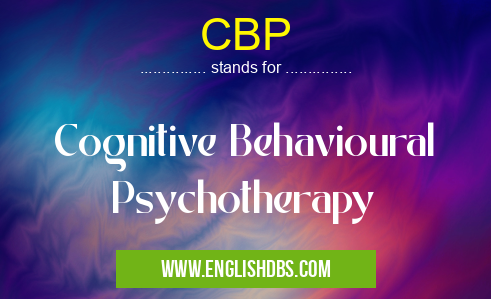What does CBP mean in UNCLASSIFIED
Cognitive Behavioral Psychotherapy (CBP) is a type of psychotherapeutic treatment that focuses on the exploration of thoughts, feelings, and behaviors in order to help individuals better manage their mental health issues. CBP has been used to treat a variety of mental health concerns, including depression, anxiety disorders, panic disorder, eating disorders, and personality disorders. Unlike traditional talk therapy, CBP combines cognitive-behavioral interventions with elements of mindfulness and acceptance-based treatment strategies. By helping individuals to identify and modify maladaptive thought patterns and behaviors, CBP can be an effective way for individuals to gain insight into their problems and develop skills for overcoming them.

CBP meaning in Unclassified in Miscellaneous
CBP mostly used in an acronym Unclassified in Category Miscellaneous that means Cognitive Behavioural Psychotherapy
Shorthand: CBP,
Full Form: Cognitive Behavioural Psychotherapy
For more information of "Cognitive Behavioural Psychotherapy", see the section below.
Definition
CBP stands for Cognitive Behavioral Psychotherapy which is defined as a form of psychotherapy where the focus is on exploring thoughts, feelings and behaviors with the goal of changing unhelpful or unhealthy responses or patterns. CBP has been used to address various psychological issues like depression, anxiety disorders, panic disorder, eating disorders and personality disorders. It utilizes both cognitive-behavioral elements - such as restructuring thinking processes - and mindfulness/acceptance based techniques such as relaxation exercises and meditation methods.
Benefits
The primary purpose of Cognitive Behavioral Psychotherapy (CBP) is to help people overcome psychological issues by identifying maladaptive ways of thinking or responding to situations – such as negative self-talk – and replacing them with more beneficial ones. After gaining insight into these maladaptive ways of thinking/behaving through CBP’s cognitive-behavioral approach, it then helps individuals develop coping skills that can improve their lives overall. Through this process patients improve their self-awareness while learning how to regulate emotions better when faced with difficult situations or people; they also learn how to effectively communicate their needs in order to create healthy relationships with others. In addition, CBP also helps individuals build resilience which decreases vulnerability to future mental health issues.
Essential Questions and Answers on Cognitive Behavioural Psychotherapy in "MISCELLANEOUS»UNFILED"
What is Cognitive Behavioral Psychotherapy (CBT)?
Cognitive Behavioral Psychotherapy (CBT) is a type of psychotherapy that focuses on helping people identify and modify behaviors and beliefs that are preventing them from feeling better. CBT looks at how thoughts, feelings, and behaviors interact to keep someone stuck in negative patterns. Through identifying these patterns, individuals can then work with their therapist to change them.
How does Cognitive Behavioral Psychotherapy (CBT) work?
CBT works by helping individuals identify thoughts that may be contributing to their anxiety or depression. The individual then works with the therapist to challenge irrational or self-defeating beliefs and come up with more realistic alternatives. This helps the person learn new coping skills so they can better manage difficult situations in the future.
Is Cognitive Behavioral Psychotherapy (CBT) effective?
Yes, CBT is an evidence-based form of therapy and has been proven effective for a number of mental health issues such as anxiety, depression, PTSD, and more. Research suggests that it can lead to significant improvements in symptoms within a relatively short time frame when combined with homework assignments between sessions.
Who would benefit from Cognitive Behavioral Psychotherapy (CBT)?
CBT is often used for short-term treatment of mental health issues such as anxiety, OCD, depression, substance use disorder, sleep problems, posttraumatic stress disorder (PTSD), eating disorders, chronic pain management, anger management and relationship conflicts. It is also often used as an adjunct in more long term psychodynamic therapy or other forms of talk therapy.
How long does Cognitive Behavioral Psychotherapy (CBT) take?
The length of treatment depends on a person’s individual needs but typically it takes 12-20 sessions in order to gain lasting results from cognitive behavioral psychotherapy (CBT). By challenging dysfunctional thinking patterns and developing coping strategies during these sessions clients can often experience greater satisfaction with life after completing treatment.
What happens during a session of Cognitive Behavioral Psychotherapy (CBT)?
During each session the therapist will focus on helping individuals identify patterns of thinking or behavior that are unhelpful or even self-defeating. Clients will be encouraged to ask questions about their own experiences and consider different perspectives while discussing the ways they react to different situations. Typically therapists also assign ‘homework’ between sessions which allows them to practice what they have learned in the therapy setting.
Are there any risks associated with Cognitive Behavioral Psychotherapy (CBT)?
Though CBT has many benefits it should be noted that it is not without its potential risks such as exacerbation of preexisting symptoms by engaging too heavily in certain thought processes or discussions surrounding traumatic events which could create further distress for some individuals.
Is it normal to feel worse before feeling better when using Cognitive Behavioral Psychotherapy (CBT)?
In certain circumstances it may feel like things are getting worse before they get better when utilizing cognitive behavioral psychotherapy since this means you are confronting difficult emotions/thoughts head on instead of continuing habits which mask symptoms but ultimately perpetuate underlying issues.
How do I know if I need help with my mental health issues?
It’s important to take note if your feelings are negatively impacting your relationships/daily functioning/or emotional wellbeing since this could indicate that you have a mental health issue which requires professional attention such as Cognitive Behavioral Therapy.
Final Words:
In conclusion, Cognitive Behavioral Psychotherapy (CBP) is a highly effective treatment modality designed around helping individuals gain insight into underlying disturbances affecting their mental health so that they can practice healthier responses going forward. The combination of cognitive-behavioral interventions combined with elements of acceptance-based therapies make CBP a powerful tool for those struggling with psychological issues such as depression or anxiety disorders. Through CBP practitioners can gain insight into their problems while developing coping skills necessary for ensuring continued progress in achieving success in life!
CBP also stands for: |
|
| All stands for CBP |
